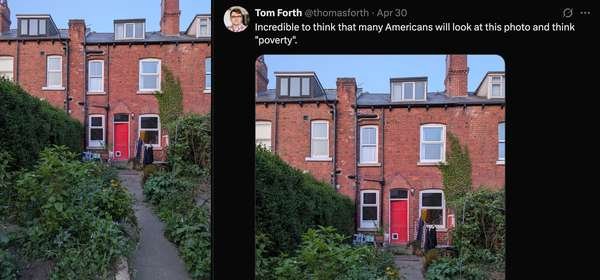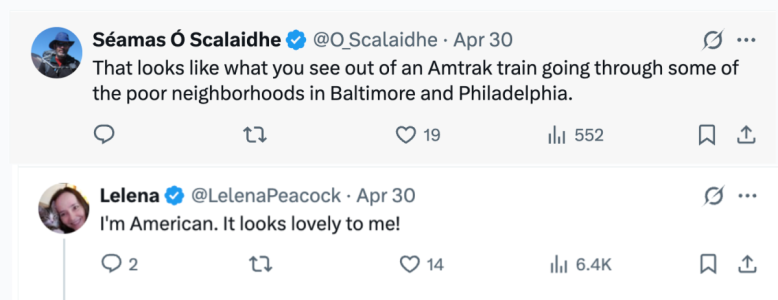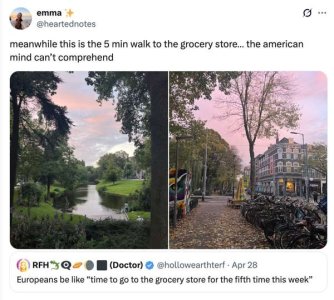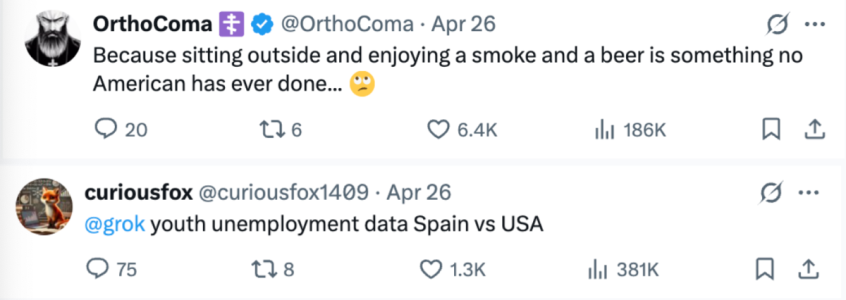This hilarious photo is sparking a wild debate between Americans and Europeans—Can you relate?
- Replies 0
If you’ve spent any time on social media lately, you might have stumbled across a photo that’s got both sides of the Atlantic in a playful (and sometimes heated) tug-of-war.
It’s called “The American Mind Can’t Comprehend This,” and it’s more than just a funny phrase—it’s become a cultural flashpoint, revealing just how differently Americans and Europeans see the world.
So, what’s behind this viral sensation, and why is it striking such a nerve? Let’s dive in, GrayVine style.
The Photo That Launched a Thousand Arguments
It all started with a simple photo: a row of classic redbrick terraced houses in Leeds, England.
To many Brits, these homes are charming, historic, and even desirable. But when Tom Forth posted the image on social media with the caption, “Incredible to think that many Americans will look at this photo and think ‘poverty,'” he lit a match under a powder keg of cultural assumptions.
The post quickly racked up over 1.6 million views and thousands of comments. Some Americans chimed in, saying the houses looked run-down or reminded them of struggling neighborhoods in US cities.
Others, both American and European, found them lovely or even aspirational. The debate quickly spiraled into a broader discussion: What does “nice” or “poor” look like, and why do the two see things so differently?

Why Do Americans and Europeans See Things So Differently?
At first glance, it might seem like just a bit of online banter. But scratch the surface, and you’ll find deep-seated differences in history, culture, and even architecture.
1. The History Behind the Houses
Terraced houses are a staple of British cities, built during the Victorian era to house workers during the Industrial Revolution.
Today, many of these homes are highly sought after—some selling for over $280,000 in cities like Leeds.
In the US, however, similar “row houses” are often found in older, urban neighborhoods that have faced economic decline, leading to a very different set of associations.
2. The American Dream vs. European Realism
For many Americans, the ideal home is a detached house with a big yard—a symbol of success and independence.
Europeans, especially in cities, are more accustomed to compact living, walkable neighborhoods, and a sense of community. What looks cramped to one person might feel cozy and convenient to another.
3. The Power of Perception
Ideas about wealth, comfort, and beauty are shaped by what is seen around us. If you grew up in the US suburbs, a terraced house might seem small or old-fashioned.
If you’re from Europe, it might evoke nostalgia or pride. The photo taps into these subconscious biases—and sometimes, it exposes them in ways that are both funny and uncomfortable.
The Photo Goes Global: More Than Just Houses
The “American Mind Can’t Comprehend This” photo didn’t stop at architecture. Soon, it was being used to poke fun at all sorts of cultural quirks:
When Jokes Turn Serious
Many of the responses reflect a notable shift in how people online are discussing cultural contrasts between Europe—especially the UK—and the United States.
While the photo format “The American mindset can’t comprehend” has been circulating for years, it originally leaned more toward playful humor.
As the British might say, it was simply a bit of harmless banter, often poking fun at quirky cultural staples like Britain’s love for baked beans, bland Chinese takeout, or Robbie Williams fandom.
But in the past year, these once lighthearted exchanges have grown far more intense.
Source: @CigsMake / X.
Take one example: after Tom posted his original image, a commenter replied, “There are abandoned Baltimore row houses dedicated to the distribution of heroin that are tidier and more appealing than these places.” Tom fired back with a darkly sarcastic, “I thought you were all killing yourselves with Fentanyl nowadays?”
This back-and-forth reflects a broader trend—online jabs have escalated from food-based jokes to heavy-hitting topics.
British and European users frequently bring up America’s gun violence, lack of universal healthcare, and opioid crisis, while Americans counter with mentions of terrorist attacks, unemployment rates, or poverty levels across Europe.
So what’s behind the rise in hostility? Newsweek recently suggested several possible catalysts, including the Trump-era tariffs that strained transatlantic relations, as well as a growing number of Europeans actively boycotting the US Travel hesitancy due to ideological differences—and lingering disapproval of Trump—has led some Brits to skip visiting the States altogether.
But the tension may go even deeper. Since the post-COVID era, cultural divergence has only widened, particularly on polarizing issues like abortion, women’s rights, and trans rights.
There’s also the argument that these frictions reflect fundamentally different lifestyle values. Some European cultures are more accepting of imperfection and indulgence—highlighted by fashion trends like indie sleaze—in contrast to America’s more polished ideals, such as athleisure, aesthetic optimization, and filtered social media perfection.
As Tom Forth explained in an email to the Daily Dot, even laundry habits highlight these cultural contrasts. “I find it funny how obsessed some Americans are with washing lines as a signifier of how well off you are,” he said.
At the end of the day, the cultural divide is undeniably heating up. But whether it’s reaching a boiling point at 212°F or 100°C—well, that depends on which side of the Atlantic you're thinking from.
Experts suggest that these online spats reflect broader tensions between the US and Europe, from political disagreements to cultural shifts.
In a world that feels increasingly divided, even a photo about houses can become a stand-in for bigger questions about identity, values, and the future.

Have you ever visited Europe and been surprised by the way people live? Or maybe you’re a European transplant who’s made a home in the US? What do you think about the “American Mind Can’t Comprehend This” photo? Share your stories, opinions, and even your favorite memes in the comments below!
It’s called “The American Mind Can’t Comprehend This,” and it’s more than just a funny phrase—it’s become a cultural flashpoint, revealing just how differently Americans and Europeans see the world.
So, what’s behind this viral sensation, and why is it striking such a nerve? Let’s dive in, GrayVine style.
The Photo That Launched a Thousand Arguments
It all started with a simple photo: a row of classic redbrick terraced houses in Leeds, England.
To many Brits, these homes are charming, historic, and even desirable. But when Tom Forth posted the image on social media with the caption, “Incredible to think that many Americans will look at this photo and think ‘poverty,'” he lit a match under a powder keg of cultural assumptions.
The post quickly racked up over 1.6 million views and thousands of comments. Some Americans chimed in, saying the houses looked run-down or reminded them of struggling neighborhoods in US cities.
Others, both American and European, found them lovely or even aspirational. The debate quickly spiraled into a broader discussion: What does “nice” or “poor” look like, and why do the two see things so differently?

A photo of a typical English terraced house posted on social media sparked debate between Americans and Europeans over whether such housing is a sign of poverty. Image source: @thomasforth / X.
Why Do Americans and Europeans See Things So Differently?
At first glance, it might seem like just a bit of online banter. But scratch the surface, and you’ll find deep-seated differences in history, culture, and even architecture.
1. The History Behind the Houses
Terraced houses are a staple of British cities, built during the Victorian era to house workers during the Industrial Revolution.
Today, many of these homes are highly sought after—some selling for over $280,000 in cities like Leeds.
In the US, however, similar “row houses” are often found in older, urban neighborhoods that have faced economic decline, leading to a very different set of associations.
2. The American Dream vs. European Realism
For many Americans, the ideal home is a detached house with a big yard—a symbol of success and independence.
Europeans, especially in cities, are more accustomed to compact living, walkable neighborhoods, and a sense of community. What looks cramped to one person might feel cozy and convenient to another.
3. The Power of Perception
Ideas about wealth, comfort, and beauty are shaped by what is seen around us. If you grew up in the US suburbs, a terraced house might seem small or old-fashioned.
If you’re from Europe, it might evoke nostalgia or pride. The photo taps into these subconscious biases—and sometimes, it exposes them in ways that are both funny and uncomfortable.
The Photo Goes Global: More Than Just Houses
The “American Mind Can’t Comprehend This” photo didn’t stop at architecture. Soon, it was being used to poke fun at all sorts of cultural quirks:
- Grocery Shopping: Europeans joke about walking to the store daily, while Americans stock up for the week with a carload of groceries.
- Outdoor Cafés: Photos of young people sipping coffee or wine on a city street spark comments about “European leisure” vs. “American hustle.”
- Laundry Habits: Believe it or not, even washing lines have become a battleground, with Europeans baffled by Americans’ love of dryers and vice versa.
Each new post adds fuel to the fire, with users from both sides chiming in—sometimes with good-natured teasing, sometimes with pointed criticism.
When Jokes Turn Serious
Many of the responses reflect a notable shift in how people online are discussing cultural contrasts between Europe—especially the UK—and the United States.
While the photo format “The American mindset can’t comprehend” has been circulating for years, it originally leaned more toward playful humor.
As the British might say, it was simply a bit of harmless banter, often poking fun at quirky cultural staples like Britain’s love for baked beans, bland Chinese takeout, or Robbie Williams fandom.
But in the past year, these once lighthearted exchanges have grown far more intense.
Source: @CigsMake / X.
Take one example: after Tom posted his original image, a commenter replied, “There are abandoned Baltimore row houses dedicated to the distribution of heroin that are tidier and more appealing than these places.” Tom fired back with a darkly sarcastic, “I thought you were all killing yourselves with Fentanyl nowadays?”
This back-and-forth reflects a broader trend—online jabs have escalated from food-based jokes to heavy-hitting topics.
British and European users frequently bring up America’s gun violence, lack of universal healthcare, and opioid crisis, while Americans counter with mentions of terrorist attacks, unemployment rates, or poverty levels across Europe.
So what’s behind the rise in hostility? Newsweek recently suggested several possible catalysts, including the Trump-era tariffs that strained transatlantic relations, as well as a growing number of Europeans actively boycotting the US Travel hesitancy due to ideological differences—and lingering disapproval of Trump—has led some Brits to skip visiting the States altogether.
But the tension may go even deeper. Since the post-COVID era, cultural divergence has only widened, particularly on polarizing issues like abortion, women’s rights, and trans rights.
There’s also the argument that these frictions reflect fundamentally different lifestyle values. Some European cultures are more accepting of imperfection and indulgence—highlighted by fashion trends like indie sleaze—in contrast to America’s more polished ideals, such as athleisure, aesthetic optimization, and filtered social media perfection.
As Tom Forth explained in an email to the Daily Dot, even laundry habits highlight these cultural contrasts. “I find it funny how obsessed some Americans are with washing lines as a signifier of how well off you are,” he said.
At the end of the day, the cultural divide is undeniably heating up. But whether it’s reaching a boiling point at 212°F or 100°C—well, that depends on which side of the Atlantic you're thinking from.
Experts suggest that these online spats reflect broader tensions between the US and Europe, from political disagreements to cultural shifts.
In a world that feels increasingly divided, even a photo about houses can become a stand-in for bigger questions about identity, values, and the future.
Key Takeaways
- A photo of a typical English terraced house posted on social media sparked debate between Americans and Europeans over whether such housing is a sign of poverty.
- The “The American mind can’t comprehend this” photo highlights cultural differences and stereotypes about lifestyles, with jokes—and arguments—about housing, shopping habits, and daily routines.
- Online, what began as lighthearted banter about cultural quirks has recently developed into more charged and sometimes hostile exchanges referencing serious issues like drug use, health care, and unemployment.
- Broader factors, including political and ideological differences, are contributing to rising tension between American and European internet users, with debates now reflecting deeper values and lifestyle preferences.
Have you ever visited Europe and been surprised by the way people live? Or maybe you’re a European transplant who’s made a home in the US? What do you think about the “American Mind Can’t Comprehend This” photo? Share your stories, opinions, and even your favorite memes in the comments below!









